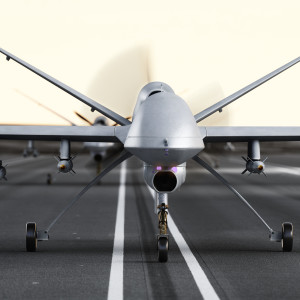The continued refusal of the Obama administration to sanction the sale of Unmanned Aerial Vehicle aircraft to Jordan provides a kind of window into the confusion and incoherence of U.S. policy in the Middle East.
Next to Israel, little Jordan (population about 8 million) has been one of our best friends in the region. It has a peace treaty with Israel, and has been seen as a moderate force in the Arab world. Its royal family, Western-educated and bilingual in English, have been favorites, politically and socially, in London and Washington.
Jordan’s King Abdullah II was educated in England and the United States, having attended tony prep schools in both countries before he attended the Royal Military Academy Sandhurst (as did his father, King Hussein), the British equivalent of the U.S. Military Academy at West Point, in 1980. Commissioned into the British army as a second lieutenant, he served for a year in 1981 as a troop commander in the 13th/18th Royal Hussars.
Abdullah took a few years off from the military in the 1980s, studying at Pembroke College, Oxford and Georgetown University. But before becoming king in 1999, he served in Jordan’s army, where he rose to the rank of major general, and air force, where he was trained to fly Cobra attack helicopters — his father was an avid and daring helicopter pilot.
My sources tell me that Abdullah is a close friend of Secretary of State John Kerry.
Yet when Jordan came a-knockin’, the administration barred the door. This with them knowing well that the Predator and the Reaper, which is a larger and more sophisticated model, are not the only Unmanned Aerial Vehicles on the market. Both Israel and China are vendors of unmanned surveillance aircraft, and Jordan is actively being courted by them. Curiouser and curiouser, as Alice cried.
The administration, while declaring its affection for Jordan, may have in mind that Jordan has been more friend than ally: Jordan did not support the U.S. invasion of Iraq. But why would that deter the Obama administration? It is because of the fight against ISIS that Jordan has requested permission to purchase unarmed Predators needed for surveillance, as well as armed ones.
The arguments for the sale, frequently championed by Rep. Duncan Hunter, R-Calif., is that it is a win-win for the United States and Jordan. Jordan gets the best technology for surveillance that money can buy; the United States gets one more eye in the sky over Syria and Iraq, which share borders with Jordan.
Sources to the left and right of the foreign policy establishment in Washington tell me they are baffled by the administration’s reluctance. Policy wonks are wondering aloud, “What is the White House thinking? It will lose a sale and Jordan will buy inferior military hardware, while being shut out of a valuable source of surveillance intelligence. If China or Israel supply drones to Jordan, U.S. access to this intelligence may come with strings.”
It is easy to understand that the administration does not know what to do about Syria. What might have been done was not done. Four years ago, there might have been the diplomatic equivalent of a plea bargain with Syrian President Bashar al-Assad, or we might have more effectively armed those rebelling against him, before those motivated by religious sectarianism became dominant.
But none of those missed opportunities justifies snubbing one of our only friends in the region, as chaos escalates beyond the wildest fears of many a Middle East Cassandra. The administration seems to have gone into a catatonic state in Middle East policy, feeling as though whatever it does will not work, and that its legacy will be written in failed states including Afghanistan, Iraq, Libya and Syria.
Hunter, who is a member of the House Armed Services Committee, said, “Damage has been done to U.S. relations with Jordan, but the simple act of approving drone exports would prevent further harm. If Jordanian policy, like President Obama’s, is to ‘degrade and ultimately destroy’ ISIS, why is the Obama administration refusing to provide an ally with the tools to do just that?”

